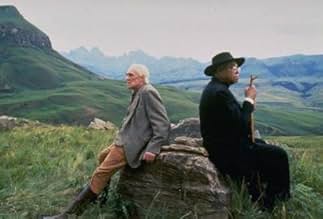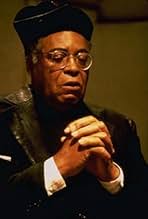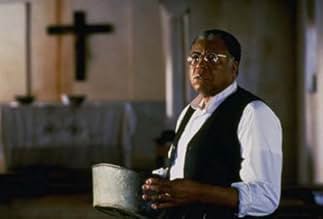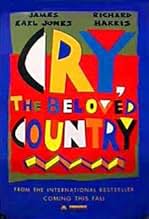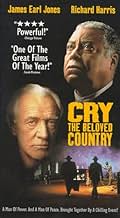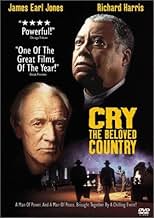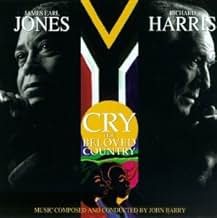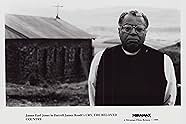CALIFICACIÓN DE IMDb
6.8/10
2.2 k
TU CALIFICACIÓN
Un predicador sudafricano va en busca de su hijo rebelde, que ha cometido un crimen en la gran ciudad.Un predicador sudafricano va en busca de su hijo rebelde, que ha cometido un crimen en la gran ciudad.Un predicador sudafricano va en busca de su hijo rebelde, que ha cometido un crimen en la gran ciudad.
- Dirección
- Guionistas
- Elenco
- Premios
- 1 premio ganado y 4 nominaciones en total
Themsie Times
- Shebeen Queen
- (as Tembsie Times)
- Dirección
- Guionistas
- Todo el elenco y el equipo
- Producción, taquilla y más en IMDbPro
Opiniones destacadas
I know most readers won't find my comments useful, but here goes anyway. I saw this movie a long long time ago but recently went looking for it on IMDb (not sure why), probably to look up snippets about Richard Harris. What I remember most about the movie was 1) the incredible cinematography - no denying that African countryside is gorgeous, and 2) the one long extended scene between James Earl Jones and Richard Harris. I don't even remember most of the dialogue, only that these two great classically-trained actors almost literally chewed the scenery. I remember that the scene was calmly played, yet both actors simmered with just-perceptible passion.
I once performed in the Kurt Weill opera of the same name. I'm accustomed to having music propel me through the story, but I didn't miss it in this movie. One casting note - probably because of recent trends in NTC (non-traditional casting), most stage shows refer to the racial divide in the opera as "whites" and "coloreds," which, under apartheid, included all non-whites. Whether or not this was intentionally done by the librettist, it gives opera companies the freedom to hire Asian-Americans, African-Americans, and Hispanic-Americans (or Europeans) as the "colored" cast. In the movie, it was starkly white and black. Nevertheless, if you lack any other reason for seeing the movie, see it for the wonderful performances of Jones and Harris.
I once performed in the Kurt Weill opera of the same name. I'm accustomed to having music propel me through the story, but I didn't miss it in this movie. One casting note - probably because of recent trends in NTC (non-traditional casting), most stage shows refer to the racial divide in the opera as "whites" and "coloreds," which, under apartheid, included all non-whites. Whether or not this was intentionally done by the librettist, it gives opera companies the freedom to hire Asian-Americans, African-Americans, and Hispanic-Americans (or Europeans) as the "colored" cast. In the movie, it was starkly white and black. Nevertheless, if you lack any other reason for seeing the movie, see it for the wonderful performances of Jones and Harris.
This film brings to life the lives of a black, country priest and a white wealthy landowner in South Africa in the 1940's.
Religion, politics, faith, healing, mercy and justice- all of these themes are present, but not in an overt, overbearing patronising way.
The two men meet due to unfortunate circumstances related to the activity of their respective sons' in the city, though they have lived in the same country area all of their lives.
Religion, politics, faith, healing, mercy and justice- all of these themes are present, but not in an overt, overbearing patronising way.
The two men meet due to unfortunate circumstances related to the activity of their respective sons' in the city, though they have lived in the same country area all of their lives.
Came to write this review because the recent hoopla around the Black Panther movie made me think of this. Our society truly is clueless when a superhero movie that isn't even a "movement" or even about Africa gets a vaulted review over gems like this. This movie here has depth, emotion, substance, heart and power behind it. All things that Black Panther does not have. One of my most favorite movies of all time and one of my go-to's when I talk about powerful movies.
This is a wonderful movie, based on the famous book. It features excellent camera work, which took full advantage of the beautiful scenery in the South African countryside. It also features an exceptional score by John Barry. In addition, the performances were quite good, although I've heard some people say they thought that James Earl Jones made Rev Kumalo too "soft around the edges". In any case, this is a quite good movie.
It's been a long time since I read the Alan Paton book upon which this film is based. Paton was banned in his own country and officially silenced but the book was universally popular throughout the 1960s.
James Earl Jones once again renders a bravura performance as the African minister whose son has accidentally killed a white man. One can feel his grief and his burden as he tries to straighten the mess out. His son has confessed but others involved have denied knowledge of the offense.
Richard Harris plays an equally difficult role that of Mr Jarvis the white boy's father. One feels his grief and pain especially when he finds to his surprise that his son had disowned "baaskap," the over-lordship of the white race, something accepted as a given by most whites without a second thought just as the white housewife perfunctorily dismissed the black cleric in priestly garb as if he were a pesty door to door salesman.
Will mercy be extended to the preacher's son who accidentally pulled the trigger and cooperated with authorities or will he suffer the ultimate penalty while accomplices go free? Yet for all the misery the movie, surprisingly without excessive preaching, ends on a flicker of hope for the future.
James Earl Jones once again renders a bravura performance as the African minister whose son has accidentally killed a white man. One can feel his grief and his burden as he tries to straighten the mess out. His son has confessed but others involved have denied knowledge of the offense.
Richard Harris plays an equally difficult role that of Mr Jarvis the white boy's father. One feels his grief and pain especially when he finds to his surprise that his son had disowned "baaskap," the over-lordship of the white race, something accepted as a given by most whites without a second thought just as the white housewife perfunctorily dismissed the black cleric in priestly garb as if he were a pesty door to door salesman.
Will mercy be extended to the preacher's son who accidentally pulled the trigger and cooperated with authorities or will he suffer the ultimate penalty while accomplices go free? Yet for all the misery the movie, surprisingly without excessive preaching, ends on a flicker of hope for the future.
¿Sabías que…?
- TriviaThe background instrumental music in the movie is the same as the theme song from the movie Zulu (1964).
- Citas
Rev Stephen Kumalo: My brother is greatly changed.
Theophilus Msimangu: But he has some truth on his side.
Rev Stephen Kumalo: "Truth"? But how can he have truth on his side and not God?
Theophilus Msimangu: At least he's got something. Look around. What do you see? Poverty, pain, suffering. Sometimes it is hard even for me to keep faith. Perhaps God is also on his side. Only your brother does not want to know it anymore.
- ConexionesFeatured in 2nd Annual Screen Actors Guild Awards (1996)
Selecciones populares
Inicia sesión para calificar y agrega a la lista de videos para obtener recomendaciones personalizadas
- How long is Cry, the Beloved Country?Con tecnología de Alexa
Detalles
Taquilla
- Total en EE. UU. y Canadá
- USD 670,727
- Total a nivel mundial
- USD 670,727
- Tiempo de ejecución1 hora 46 minutos
- Color
- Mezcla de sonido
- Relación de aspecto
- 1.85 : 1
Contribuir a esta página
Sugiere una edición o agrega el contenido que falta

Principales brechas de datos
By what name was Cry, the Beloved Country (1995) officially released in India in English?
Responda

